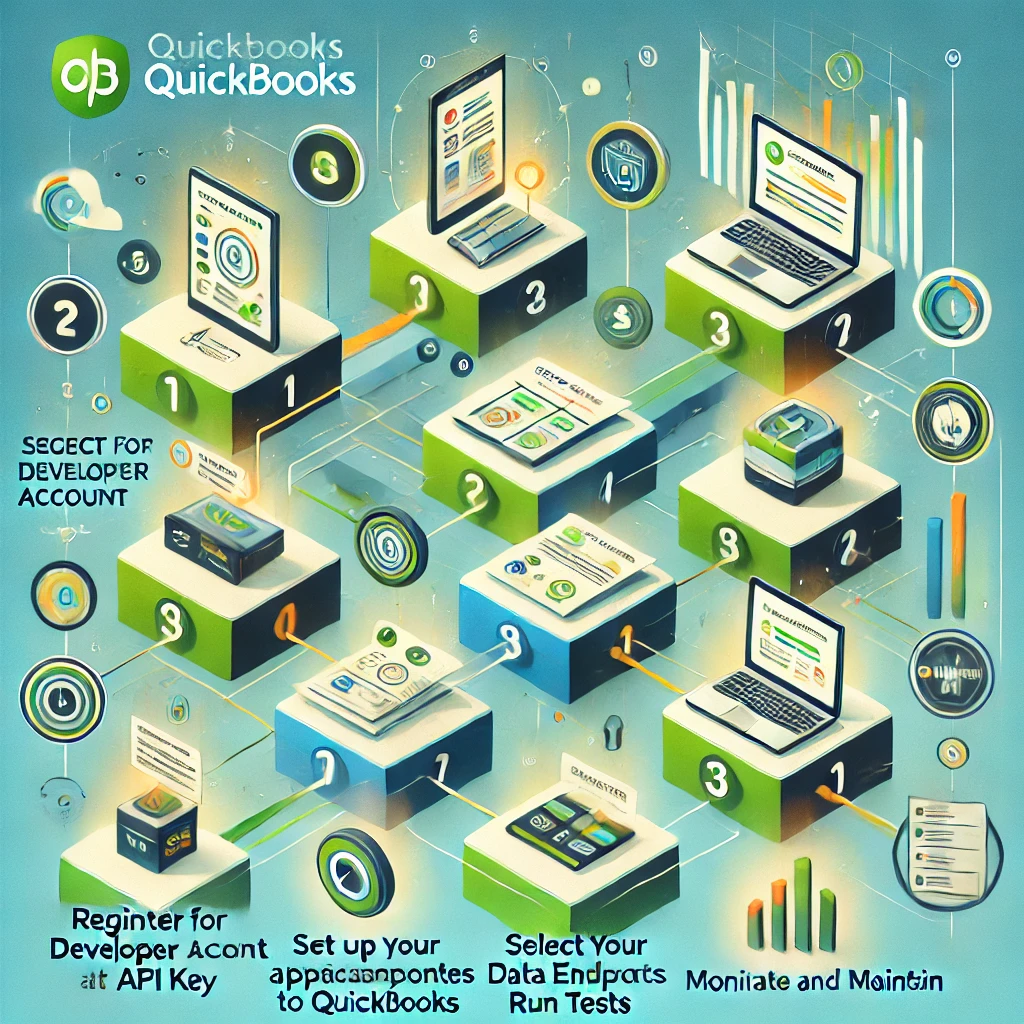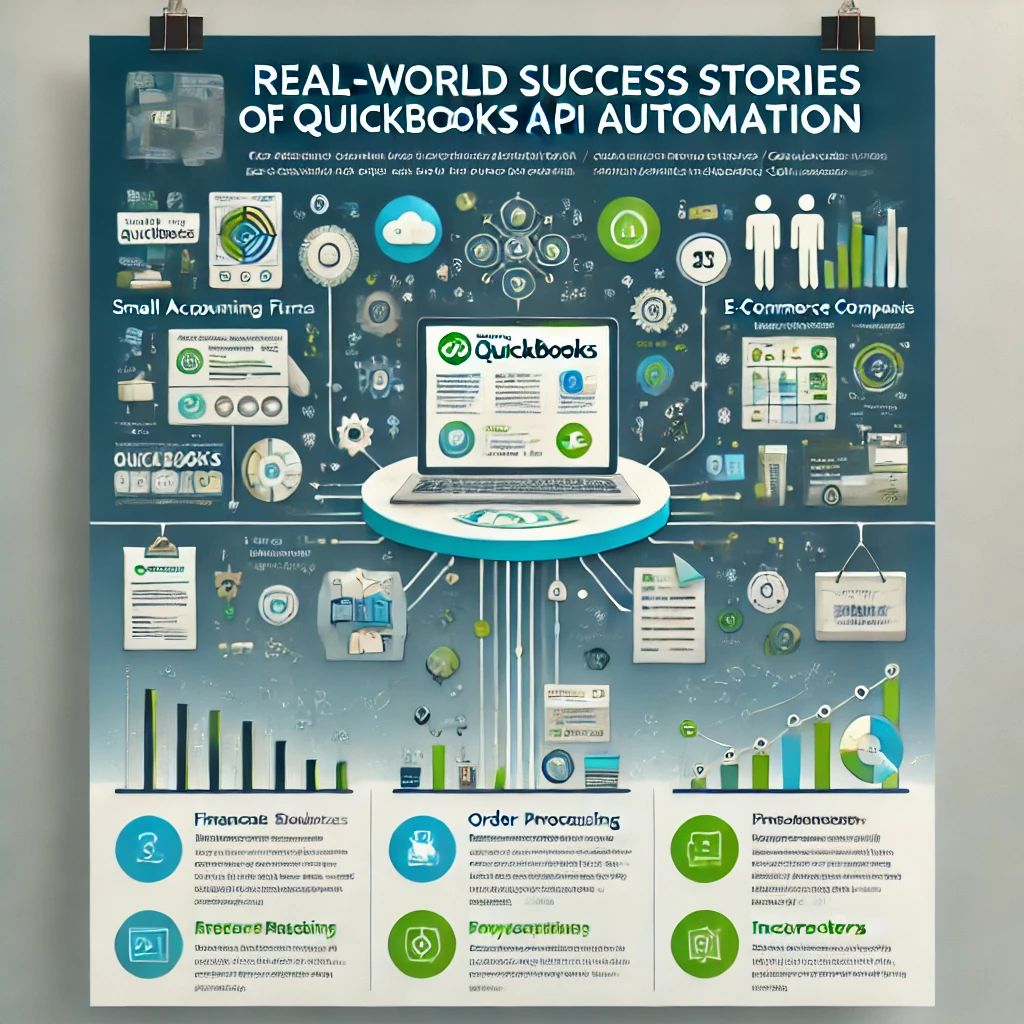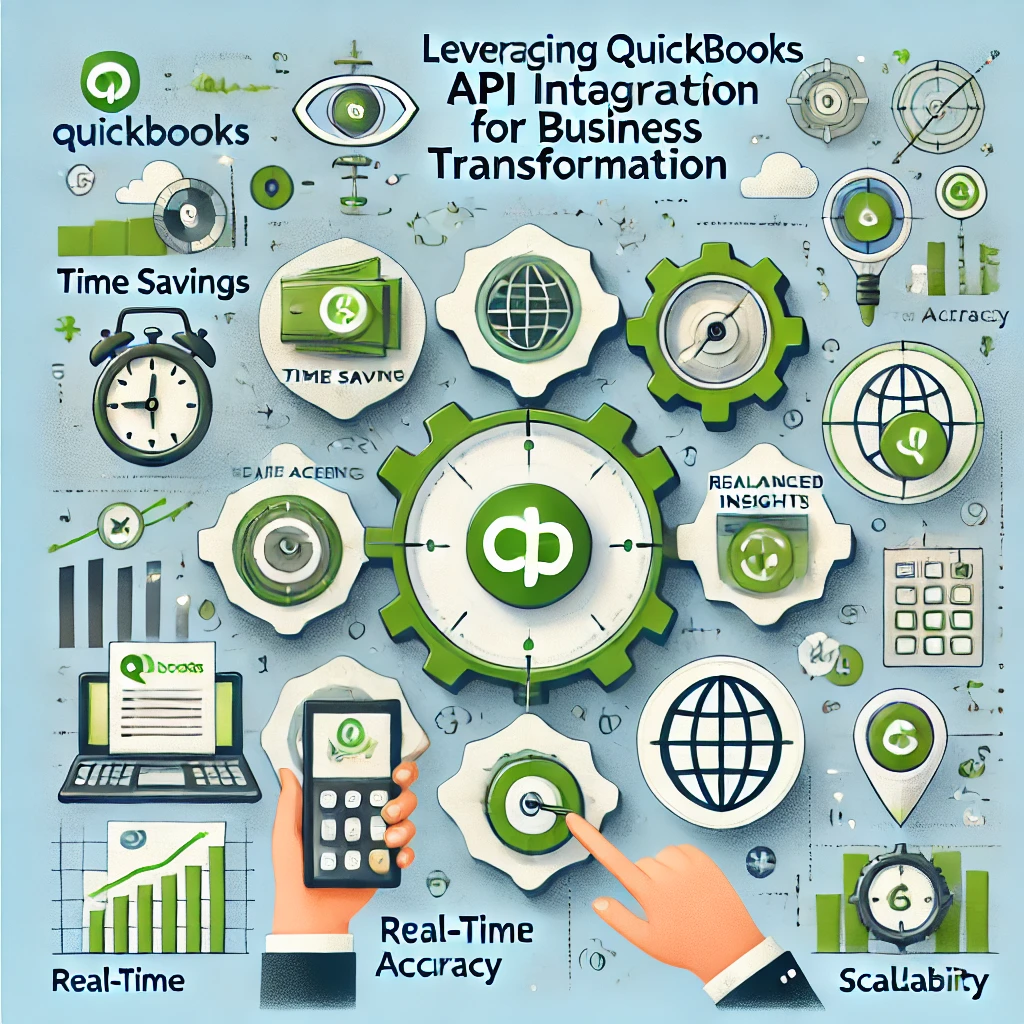Why QuickBooks API Integration is Essential for Modern Accounting
QuickBooks API integration has become a critical tool for businesses aiming to streamline their accounting processes, reduce manual work, and drive financial efficiency. As companies grow, they often face challenges in managing an increasing number of transactions, tracking expenses, and generating reports accurately. Without automation, these tasks can be time-consuming, prone to error, and costly. That’s where QuickBooks API integration shines, offering seamless automation of repetitive tasks to make accounting smoother, faster, and more reliable. Let’s explore the benefits of this integration and see how it transforms accounting operations.
Table of Contents
For further insights on enhancing efficiency through API integrations, check out our blog post, “5 Powerful Ways to Automate GitHub with API Integrations”. This guide delves into practical methods for streamlining workflows, reducing manual tasks, and optimizing project management on GitHub. Whether you’re managing repositories, tracking issues, or syncing data, these automation techniques will help you leverage GitHub APIs to boost productivity and maintain a seamless development process.
For further insights on enhancing efficiency through API integrations, check out our blog post, “5 Powerful Ways to Automate GitHub with API Integrations”. This guide delves into practical methods for streamlining workflows, reducing manual tasks, and optimizing project management on GitHub. Whether you’re managing repositories, tracking issues, or syncing data, these automation techniques will help you leverage GitHub APIs to boost productivity and maintain a seamless development process.
For further insights on enhancing efficiency through API integrations, check out our blog post, “5 Powerful Ways to Automate GitHub with API Integrations”. This guide delves into practical methods for streamlining workflows, reducing manual tasks, and optimizing project management on GitHub. Whether you’re managing repositories, tracking issues, or syncing data, these automation techniques will help you leverage GitHub APIs to boost productivity and maintain a seamless development process. https://smplfy.co/https-smplfy-co-blog-github-automation/
Understanding QuickBooks API: How It Works and What It Offers
The QuickBooks API allows developers to connect QuickBooks with other software applications, providing access to a range of accounting and financial data. This API offers endpoints for transactions, customers, vendors, invoices, and reports, allowing businesses to manage these aspects without manual intervention. By integrating with other software, the QuickBooks API can automate key tasks such as data synchronization, report generation, and payment processing. This automation provides businesses with real-time insights into their finances, enabling faster decision-making and more accurate financial reporting.
For those unfamiliar with API integration, Intuit, the company behind QuickBooks, provides extensive documentation to help you get started. You can also find many tutorials and community forums where developers share insights and tips on utilizing the QuickBooks API effectively.
The Benefits of Automating Accounting Processes with QuickBooks API
Automating accounting processes with QuickBooks API integration offers a transformative shift for businesses looking to enhance efficiency, reduce errors, and gain real-time financial insights. Here’s a deeper look into the key benefits:
Enhanced Accuracy
One of the most significant advantages of QuickBooks API integration is the improvement in data accuracy. Manual data entry often leads to errors, whether through simple typos, miscalculations, or duplicate entries, which can skew financial records and impact decision-making. By automating data entry and transaction management, QuickBooks API ensures that records are consistent and free from common manual entry mistakes. This higher level of accuracy helps businesses avoid costly financial misstatements and supports smoother audits, providing a solid foundation for reliable financial management.
Time Savings
Accounting tasks, especially those that involve repetitive processes, are notorious time-drainers. With QuickBooks API, routine tasks such as generating invoices, reconciling payments, categorizing expenses, and preparing reports can be automated. This automation allows finance teams to reclaim hours previously spent on mundane, repetitive work and channel their time into strategic, high-value activities. For example, rather than spending hours on data entry, teams can focus on financial planning, forecasting, and analyzing financial trends, which can positively impact the company’s bottom line.
Real-Time Financial Insights
With QuickBooks API integration, data is synchronized across all systems in real time. This means financial information, such as revenue, expenses, and cash flow, is always up to date, allowing business leaders to gain immediate insights into the organization’s financial health. Access to real-time data empowers leaders to make informed, data-driven decisions quickly. For instance, understanding current cash flow status helps determine whether the business can afford a new investment or if budget adjustments are needed. Having these insights at their fingertips enables leadership teams to act proactively, rather than reacting to outdated information, which can make a critical difference in competitive markets.
Scalability
As businesses grow, so does their volume of transactions, expenses, and other financial data. Managing this data manually can quickly become unmanageable and time-consuming. QuickBooks API integration is built to handle high volumes of data efficiently, ensuring that your accounting system can scale alongside your business growth. This scalability means that no matter the transaction volume, the API can process and sync data without compromising speed or accuracy. Additionally, as the business evolves, QuickBooks API can integrate with other systems and tools, adapting seamlessly to new demands. This flexibility allows companies to add on functionalities as needed without having to overhaul their existing accounting setup, saving both time and resources in the long run.
The Benefits of Automating Accounting Processes with QuickBooks API
Automating accounting processes with QuickBooks API integration offers a transformative shift for businesses looking to enhance efficiency, reduce errors, and gain real-time financial insights. Here’s a deeper look into the key benefits:
Enhanced Accuracy
One of the most significant advantages of QuickBooks API integration is the improvement in data accuracy. Manual data entry often leads to errors, whether through simple typos, miscalculations, or duplicate entries, which can skew financial records and impact decision-making. By automating data entry and transaction management, QuickBooks API ensures that records are consistent and free from common manual entry mistakes. This higher level of accuracy helps businesses avoid costly financial misstatements and supports smoother audits, providing a solid foundation for reliable financial management.
Time Savings
Accounting tasks, especially those that involve repetitive processes, are notorious time-drainers. With QuickBooks API, routine tasks such as generating invoices, reconciling payments, categorizing expenses, and preparing reports can be automated. This automation allows finance teams to reclaim hours previously spent on mundane, repetitive work and channel their time into strategic, high-value activities. For example, rather than spending hours on data entry, teams can focus on financial planning, forecasting, and analyzing financial trends, which can positively impact the company’s bottom line.
Real-Time Financial Insights
With QuickBooks API integration, data is synchronized across all systems in real time. This means financial information, such as revenue, expenses, and cash flow, is always up to date, allowing business leaders to gain immediate insights into the organization’s financial health. Access to real-time data empowers leaders to make informed, data-driven decisions quickly. For instance, understanding current cash flow status helps determine whether the business can afford a new investment or if budget adjustments are needed. Having these insights at their fingertips enables leadership teams to act proactively, rather than reacting to outdated information, which can make a critical difference in competitive markets.
Scalability
As businesses grow, so does their volume of transactions, expenses, and other financial data. Managing this data manually can quickly become unmanageable and time-consuming. QuickBooks API integration is built to handle high volumes of data efficiently, ensuring that your accounting system can scale alongside your business growth. This scalability means that no matter the transaction volume, the API can process and sync data without compromising speed or accuracy. Additionally, as the business evolves, QuickBooks API can integrate with other systems and tools, adapting seamlessly to new demands. This flexibility allows companies to add on functionalities as needed without having to overhaul their existing accounting setup, saving both time and resources in the long run.
Step-by-Step Guide to Setting Up QuickBooks API Integration
Setting up a QuickBooks API integration can seem daunting, but by breaking it down into manageable steps, the process becomes straightforward:
- Register for a QuickBooks Developer Account: Start by creating an account on the QuickBooks developer portal. Once registered, you’ll gain access to their API documentation and resources.
- Set Up Your API Key: QuickBooks requires API keys for integration. Generate your API key in the developer account and keep it secure.
- Connect Your Application to QuickBooks: Use the API key to link your application with QuickBooks. Most integrations will involve OAuth 2.0 for secure authorization.
- Select the Data Endpoints You Need: QuickBooks offers various data endpoints like invoices, customers, and transactions. Choose the ones relevant to your business needs.
- Run Tests: Test the API connection to ensure data flows smoothly between QuickBooks and your application.
- Automate Desired Tasks: Set up automation rules for tasks such as expense categorization, invoice generation, or customer payments.
- Monitor and Maintain: Regularly review your integration to ensure it works correctly and that no updates are needed for security and functionality.

Each step is documented in detail on the QuickBooks API documentation page, which provides code samples and troubleshooting tips.
Top Automation Ideas for Small and Medium-Sized Businesses
QuickBooks API can automate numerous accounting tasks, streamlining business processes for maximum efficiency. Here are some top automation ideas to consider:
- Automatic Invoice Generation and Sending: Use QuickBooks API to create and send invoices as soon as a sale is made, ensuring clients receive bills promptly.
- Expense Categorization and Tracking: Automatically categorize expenses based on preset rules, helping you keep track of spending and reducing the risk of misclassification.
- Payment Reminders and Reconciliation: Send automatic payment reminders to clients, and reconcile payments with invoices to maintain up-to-date accounts receivable records.
- Payroll Processing Integration: Integrate payroll software with QuickBooks to ensure seamless payment processing and accurate record-keeping for salaries and wages.
- Inventory Management: Sync inventory data with QuickBooks to automate stock level updates, reducing the risk of over-ordering or stock shortages.
For more ideas, HubSpot and Zapier offer various templates and workflow guides that make automating QuickBooks tasks even easier.
Best Practices to Secure Your QuickBooks API Integration
Security is a crucial factor when integrating QuickBooks with other applications. Here are some best practices to keep your financial data safe:
- Use Secure Authentication: Rely on OAuth 2.0 for authentication, which ensures that user credentials remain secure during the integration process.
- Limit Permissions: Only grant the API access to necessary data to reduce the risk of unauthorized access.
- Implement Data Encryption: Encrypt sensitive financial data to protect it from interception during data transfer.
- Regularly Review Access Logs: Keep track of who accesses your data through the API, and review logs to spot any unusual activity.
- Stay Updated with QuickBooks API Changes: QuickBooks periodically updates its API for security and functionality improvements. Keep your integration updated to stay secure.
You can also read more about API security best practices in the OWASP API Security Guide.
Real-World Success Stories of QuickBooks API Automation
The power of QuickBooks API automation has been transformative for businesses across various sectors, allowing them to streamline their financial operations, save time, and make data-driven decisions. Here are some standout examples illustrating how different types of businesses have successfully leveraged this technology to enhance their accounting processes:
Small Business Accounting Firms
For small accounting firms, efficiency is key to providing timely and accurate services to clients. Firms such as KPMG have implemented QuickBooks API integrations to automate data synchronization, generate real-time financial updates, and reduce the need for manual data entry. By automating these processes, accountants can focus on more value-added services, like advising clients on financial planning and tax optimization. For instance, instead of manually updating client records, the QuickBooks API enables an automatic flow of financial information, keeping records current and accessible. This level of efficiency allows firms to scale their services without significantly increasing their workload, providing faster insights to clients and improving overall service quality.
E-commerce Companies
In the e-commerce world, managing transactions, tracking payments, and keeping up with inventory can be complex, especially for high-traffic platforms. Companies like Shopify have harnessed the power of QuickBooks API to automate financial operations seamlessly.
By syncing order and expense data in real time, Shopify provides e-commerce vendors with a consolidated view of their finances. This integration enables automated order processing, payment reconciliation, and expense tracking, so vendors know exactly how much they are earning and spending at any given moment. For example, when a sale is made, the QuickBooks API can automatically generate an invoice, update the inventory, and record the transaction. This automation not only saves time but also reduces errors and allows business owners to make more informed decisions about inventory and cash flow.
Freelancers and Contractors
Independent professionals, such as freelancers and contractors, also stand to benefit significantly from QuickBooks API automation. Unlike larger businesses, freelancers often work alone and may not have the time or resources to manage extensive accounting processes manually.
With QuickBooks API, they can set up automated invoicing, tracking, and payment reminders, which simplifies financial management and improves cash flow. For instance, a freelancer can automatically generate and send an invoice upon project completion, track client payments, and categorize expenses for tax purposes. This kind of automation allows freelancers to focus more on their work and less on administrative tasks, providing them with peace of mind that their finances are well-organized and up-to-date.

These examples underscore the flexibility and versatility of QuickBooks API integration, proving that businesses of all sizes and industries can benefit from its automation capabilities. By streamlining operations, minimizing errors, and providing real-time financial insights, QuickBooks API has enabled countless organizations to manage their finances more effectively, fostering growth and improving overall financial health.
Leveraging QuickBooks API integration can be a game-changer for businesses looking to automate accounting processes. From saving time to enhancing accuracy and offering real-time insights, the possibilities for transformation are vast. By setting up QuickBooks API integration thoughtfully and following best practices for security, you can create a streamlined, automated accounting system that frees up time for more strategic work and growth.


